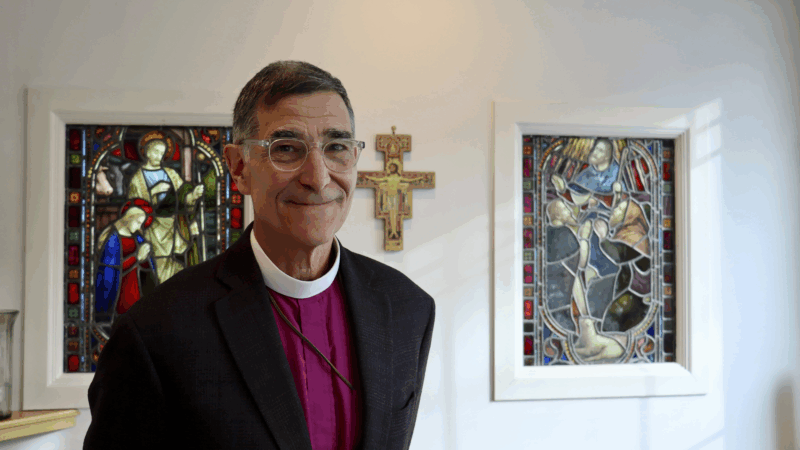Does ALDOT Just Do What They Want?
As a federal judge considers a lawsuit seeking to block a planned rebuilding and expansion of Interstate 20/59 through downtown Birmingham, opponents of road projects often contend state transportation leaders ignore local concerns. They say the Alabama Department of Transportation does what it wants or that ALDOT doesn’t listen.
To understand the tension between the local and state level perhaps it’d be helpful to look at a different highway project from Birmingham’s past. It was 2006 and the state announced plans for a 14-mile, elevated toll road on U.S Highway 280 running from the Red Mountain Expressway to Eagle Point Parkway. That would mean four lanes of traffic, 35 feet in the air above the existing highway, designed to reduce congestion on 280.
The project concerned Homewood resident Marc Beaumont who lives just one lot away from the highway.
“The plan quite frankly was so horrendous that it just moved me, let’s put it that way,” says Beaumont.
Beaumont co-founded the group Rethink 280, a grassroots organization opposed to the plan.
City leaders along the route took note too, such as Mountain Brook City Manager Sam Gaston.
“We felt like it would, of course, be very unattractive,” says Gaston. “It would split our community. We do have some areas there on the west side of Highway 280. And also we were concerned with the upkeep and felt like it might not be in the best interest of our community.”
What followed was years of back-and-forth, a redesign and meetings. Marc Beaumont likened it to being on a public meeting speaking circuit.
“ALDOT would go before us because it’s on the docket and they’ll go and give their 15 minutes,” says Beaumont. “We’ll go and completely dispute everything they just said and give our presentation.”
Of course, drive along 280 today and there’s no elevated tollway. The plan faded away, although that’s arguably because of the ballooning cost, not just local opposition. The state did install adaptive traffic signals and redesigned intersections in 2013 which improved traffic flow.
The idea for an elevated highway did not originate with current ALDOT leadership, but the question persists: does ALDOT just do what they want?
“They do just do what they want and they are incredibly dismissive,” says Beaumont.
Mountain Brook’s Sam Gaston doesn’t see it that way.
“I’ve always felt like ALDOT, especially under the leadership of John Cooper, they do listen to you,” says Gaston.
John Cooper is the ALDOT director. He says accusations of running roughshod over local communities is simply not true.
“That notion strikes me, to quote an artist from my era, John Denver, as far out,” says Cooper.
Cooper says he’s made changes to many projects, including the I-20/59 plans, because of community input. However, he could not point to a project during his five-year tenure that was canceled because of grassroots opposition. He adds he’s limited in what he can and can’t do by federal law.
“What [opponents are] really saying is you didn’t agree with me,” says Cooper. “Unfortunately that’s always true with somebody. There’s no project we’ve ever done that’s pleased everyone.”
Robert Puentes is a senior fellow at the Brookings Institution. He says some of this clash between local and state leaders may be differing mindsets. He says state transportation leaders are still largely in a 1950s era where moving people and goods are the top priority.
“Cities, just given where they are, are thinking differently about what the transportation programs are,” says Puentes. “The state DOTs in some ways are still following a traditional path.”
But ALDOT director John Cooper says if cities are changing their thinking, it’s not changing highways. He says most cities are maintaining or rebuilding highways where they are.
One particular flashpoint around the I-20/59 work came earlier this year from Birmingham Mayor William Bell. After giving his State of the City address to the Birmingham Rotary Club in January, he was asked why he didn’t speak out against the plan.
“The problem that I have with voicing too strong an opinion is sometimes ALDOT may hold you hostage,” Bell says. “If you don’t agree to one thing, they cut you off on another thing.”
Cooper says he doesn’t know what the mayor is referring to.
“We have not threatened to do that,” says Cooper. “We have not either referred or inferred in anyway that that would be done. I know of no plans on anybody’s part to do that.”
Cooper says I-20/59 through downtown needs to be dealt with and the current plan, or any plans, won’t please everyone. He doesn’t take it personally. After all, it’s his job.
U.S. military troops on standby for possible deployment to Minnesota
The move comes after President Trump again threatened to invoke the Insurrection Act to control ongoing protests over the immigration enforcement surge in Minneapolis.
Martin Luther King Jr. had a dream … about health care
A doctor from Nigeria tells what Martin Luther King Jr. taught him about health, Justice and inequality.
Sunday Puzzle: It takes two
Ilyse Levine-Kanji of Westborough, Massachusetts plays the puzzle with Weekend Edition Puzzlemaster Will Shortz and host Ayesha Rascoe.
Venezuela: Maduro’s enforcer Cabello still central to power
The ousting of Venezuela's president raised hopes of change — but the politician now controlling the streets shows how little has really shifted.
Amid ICE clashes, New Hampshire bishop urges clergy to prepare their wills
The Episcopal bishop of New Hampshire told priests protesting ICE to get their wills and affairs in order. Some praise the bishop, while other priests say they never signed up to be martyrs.
New York Giants hire John Harbaugh as coach after identifying him as their top choice
Harbaugh joins the Giants 11 days after he was fired by the Baltimore Ravens. The Super Bowl champion is now tasked with turning around a beleaguered franchise.







